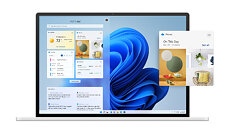Friday, June 25th 2021

Microsoft Announces Windows 11 is Coming as a Free Upgrade Over Windows 10
Yesterday, we reported the launch of Microsoft's next-generation Windows 11 operating system. Featuring a broad range of improvements that include the new and redesigned UI elements, 40% smaller updates, layouts, widgets, and a bunch of other stuff, existing Windows 10 users are wondering how and when they will be able to experience the new OS. The OS is coming later this year, with some preview beta builds supposed to arrive in the coming weeks. That means that a large portion of people is interested in trying out even the beta version. However, there is an important note about the new OS. When it officially comes out, all of the existing Windows 10 users can upgrade to Windows 11 for free, by just performing the software update.
To run the new OS, Microsoft lists a few new requirements like 4 GB of RAM, 64 GB of storage, 1+ GHz dual-core processor, and Trusted Platform Module (TPM) 2.0. The TPM 2.0 needs to be physically present, however, it is often turned off in BIOS, so future users need to enable it in BIOS as well. For more details, please head over to Microsoft website to find greater details on the upgrade.
To run the new OS, Microsoft lists a few new requirements like 4 GB of RAM, 64 GB of storage, 1+ GHz dual-core processor, and Trusted Platform Module (TPM) 2.0. The TPM 2.0 needs to be physically present, however, it is often turned off in BIOS, so future users need to enable it in BIOS as well. For more details, please head over to Microsoft website to find greater details on the upgrade.

46 Comments on Microsoft Announces Windows 11 is Coming as a Free Upgrade Over Windows 10
ya I’d imagine this will get force fed like what happened to everyone on win 7,8,8.1
I'm actually pretty satisfied with Win 10 but obviously gonna wait a bit before upgrading like usual.
Newer Intel platforms have Intel PTT (Platform Trust Technology) which is a firmware based TPM 2.0.
Newer AMD platforms likewise have fTPM as their firmware TPM 2.0 implementation.
I don't know how far back either goes...but I do know my 8th gen NUC has Intel PTT in it so your mileage may vary.
Additionally many motherboards have a TPM connector on them for adding a discrete TPM...but sadly said TPMs arent compatible with different brands of MB so you need to match MSI to MSI, Asus to Asus etc...not to mention differing pin counts within the same manufacturer to navigate and good luck finding any in stock.
To be fair though, 10 did some things better than 7 did that made my life just a little easier.. sometimes its the little things..
No regrats. ;)
You are the product :D
Your skylake based system doesn't make the cut on the intel side.
But in general, I always preferred Linux than Windows.
unless you plan to still be using that hardware after 2025You are on a X570 board your system is new enough. check my post
however those intel rigs in your sig are too old.
www.techpowerup.com/forums/threads/microsoft-launches-windows-11-operating-system.283750/post-4548420
@W1zzard lol may need some kinda sticky going to be getting this question alot over the next 6 months!
Computer configuration -> administrative templtes -> windows components -> bitlocker drive encyrption -> operating system drives -> double click require additional authentication at startup -> change it to enabled and tick the tickbox that says allow bitlocker without a compatible TPM (requires a password or startup key on a USB flash drive)
M$ just set some arbitrary cut off date for the list. The 300GE just happened to be released late.
There are no practical difference between the X299 platform CPUs, except the Kabylake-X stuff where Intel soldered a Desktop die on the LGA2066 package.
The only difference on the 10980XE is that it has a soldered lid and have some of the security fixes built in.
AMD: docs.microsoft.com/en-us/windows-hardware/design/minimum/supported/windows-11-supported-amd-processors
Intel: docs.microsoft.com/en-us/windows-hardware/design/minimum/supported/windows-11-supported-intel-processors